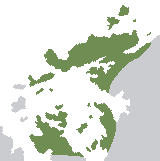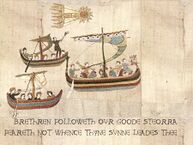Thelarike
Jump to navigation
Jump to search
This article is incomplete because it is pending further input from participants, or it is a work-in-progress by one author. Please comment on this article's talk page to share your input, comments and questions. Note: To contribute to this article, you may need to seek help from the author(s) of this page. |
Thelarike Kingdom | |
|---|---|
| from 500s CE – to 1500s | |
|
Flag | |
 The Thelarike Kingdom at its greatest extent | |
| Status | Kingdom |
| Government | Monarchy |
| Legislature | Forsamling |
| Historical era | Post-Classical Era |
| Today part of | |
The Thelarike Kingdom was an ancient kingdom located in the geographical Buranian region of northern Europa on Eurth.
Etymology
The name "Thelarike" comes from Thelar + rik (suffix: "king", "ruler"). It is related to the Buran tribe of Thelar. This tribe inhabited northwest corner of Burania, including the Parnu peninsula. Out of this region formed the kingdom of Thelarike ("realm of Thelar").
Geography
History
Narwhal throne of the Fisher Kings of Thelarike, with Aroman details.
Olrik Naddoddson and his men follow the San. Early wurld maps display north at the bottom.
The kingdom shared a common history with its northern Buran neighbours.
- 500s BCE: Not much is known about the area. Part of Buranian clanlands. Only mentioned in Aroman sources as a source of resources.
- 500s CE: Thelarike ("realm of Thelar") ruled by a line of Fisher Kings.
- Thelarania ("tribe of Thelar") includes the peninsula of what is now Deltannia.
- Thelamark along the border with Volsci form of the name was Þelamörk or Þilamörk. The first element; Þilir was the name of the inhabitants, and is assumed to be connected with Þelli (pine). The last element mörk means forest or march.
- Thelasur is the southern part. The name comes from Thelar + Sur / Syd (south). Present-day Tal Shiar.
- 516: Semi-legendary king Hrólfr Kraki.
- 887: Olrik Naddoddson is banished from Thelarike "because of some killings". He and his family lead a Buranian exploration into the Adlantic Ocean.
- 1000s: Early exploration of the Storm Sea and Adlantic Ocean.
- 1500s: (The last heathen areas are converted to whichever religion was dominant in the nearby Occident.)
See also
References

